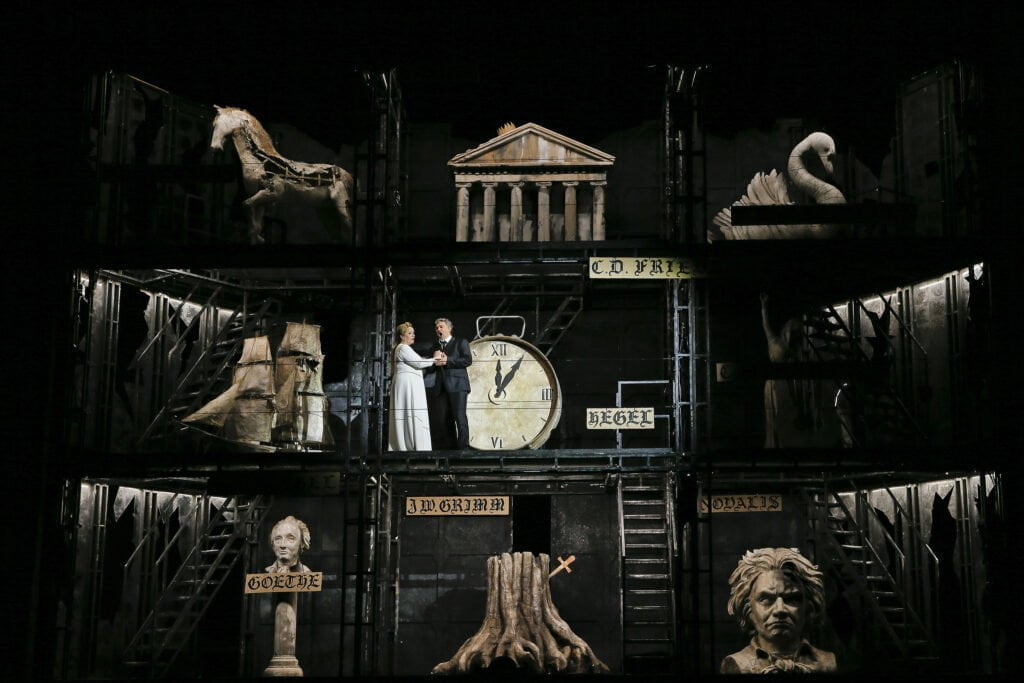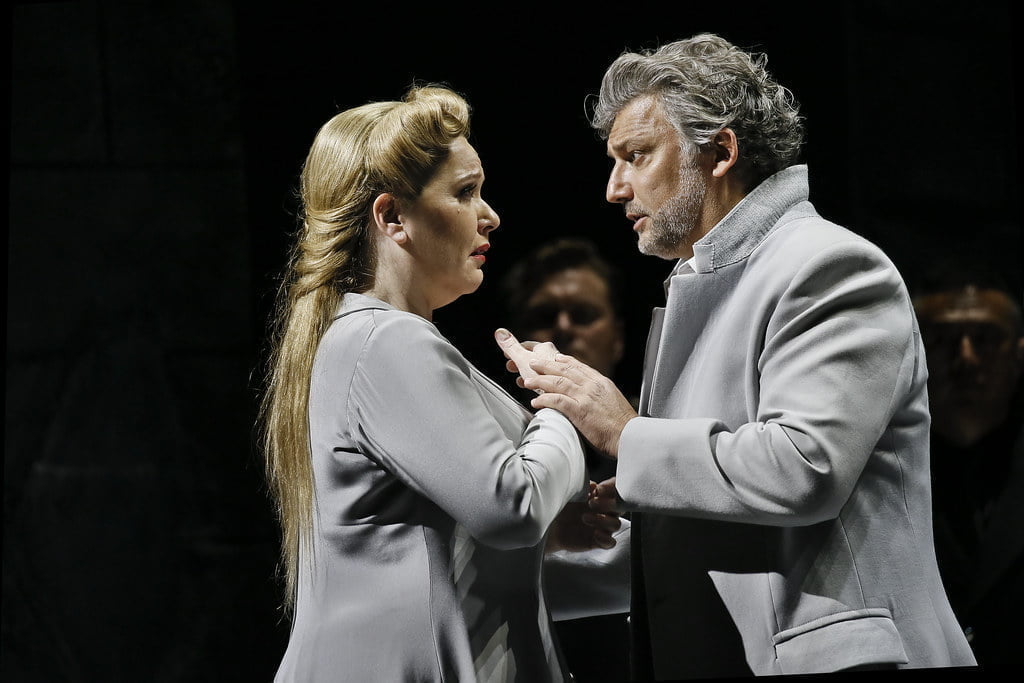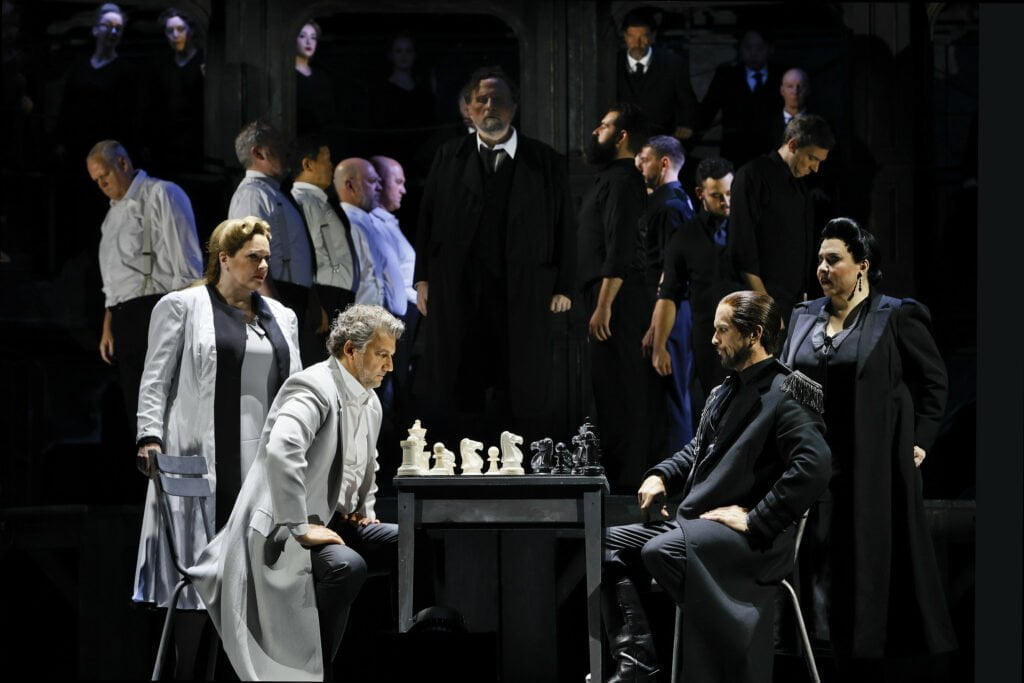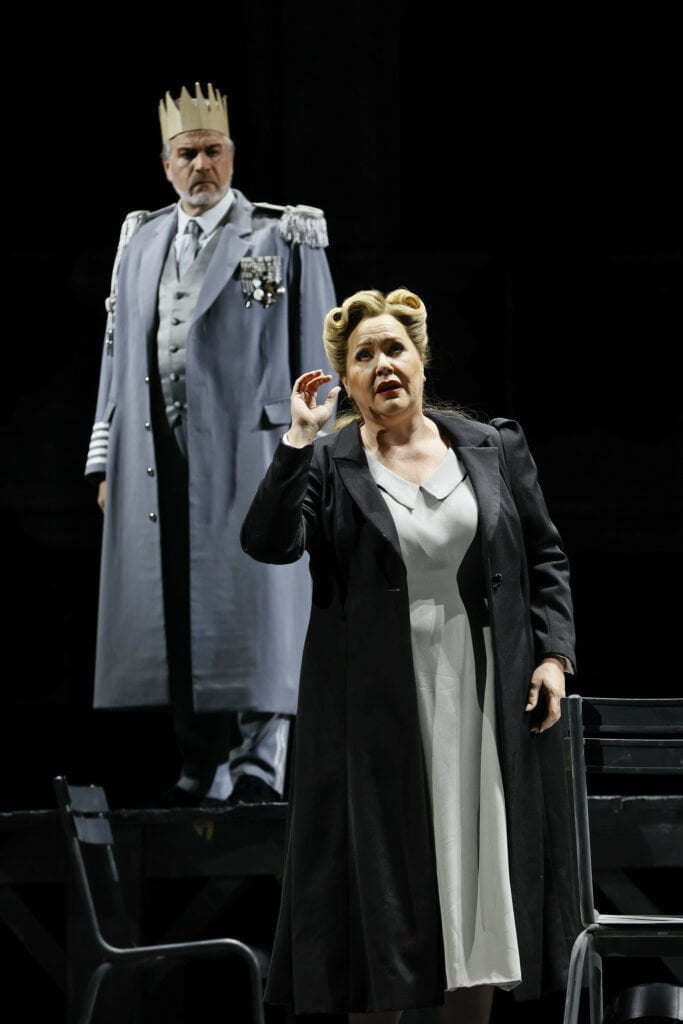“The show was pure panem et circenses – scenery porn more reliant upon empty spectacle than any emotional or human insight.”
Lohengrin. Opera Australia, Saturday May 14, 2022. State Theatre, Arts Centre Melbourne. Reviewed for Opera Gazet by David Meadows. 14 may 2022.
CONDUCTOR: Tahu Matheson
DIRECTOR: Olivier Py
REVIVAL DIRECTOR: Shane Placentino
ELSA: Emily Magee; ORTRUD: Elena Gabouri; LOHENGRIN: Jonas Kaufmann; TELRAMUND: Simon Meadows; HERALD: Warwick Fyfe; HEINRICH: Daniel Sumegi; FIRST NOBLE: Dean Bassett; SECOND NOBLE: Tomas Dalton; THIRD NOBLE: Nathan Lay; FOURTH NOBLE: Ryan Sharp; Opera Australia Chorus; Orchestra Victoria
Music: 4,5*
Direction: 2*
You can have any review automatically translated. Just click on the Translate button,
which you can find in the Google bar above this article.
As a director of opera myself, I am always perplexed by the assertion of fellow opera fans – on and off stage – who insist that opera is “all about the singing.” It is not. Credible staging and a fully rehearsed dramatic realization are just as important. Why else the expense and bother of sets and costumes, lighting and scenic conceits, weeks of blocking rehearsals, the pretense at character and drama, the attempted representation of some kind of reality, and a text that is structurally interchangeable with that of a spoken play? Why have the art-form at all, frankly, if we’re ignoring that opera was invented under the Medicis and the Camerata out of dramatic, rather than musical necessity, with music originally interpolated to support drama, text, and emotional landscape and not the other way around?
Thus, when I come out of the show and think to myself, “Nice music making, shame about the production”, I can’t pretend to be anything other than supremely annoyed at having attended nothing more than a concert in costume. Whether the staging is traditional or radical, libretto-faithful or bastardised by egomania, I feel slapped across the face if the human drama is cheated of its due. I am, of course, happy that the singing and the playing has been of such an exceptionally high order (I wouldn’t be much of an opera fan if I wasn’t), but if half of the equation is MIA, then that’s a shortfall of epic proportions. Sadly, it happens to be a shortfall that companies and intendants around the world not only tolerate, but apparently actively embrace.

Which brings us to Opera Australia’s current production of Lohengrin. Under the baton of Opera Australia’s Head of Music, Tahu Matheson, Wagner’s fairytale romantic drama (here more Grimm than Disney, and grim indeed) was, musically speaking, gorgeous, lush, and sweeping, with an almost flawless musical execution.
Jonas Kaufmann’s star turn in the title role was as polished as you’d expect from the most popular tenor in the world enjoying the very height of his success. He was never anything less than fully present, committed, in thrilling voice, and taking proceedings perfectly seriously. There was a reliance on mezzavoce that bordered on indulgent, but it was never less than magnificently and stylishly delivered. His realization of the show’s hit solo “In fernem Land” was as ravishing as any version I’ve heard, even if the production had no idea what it was doing to serve it.
American soprano Emily Magee sang admirably, but she possesses a vocal maturity that, sadly, belies Elsa’s feckless naïveté. The absenteeism of the production’s three directors didn’t help, and the character came across as perfunctory and “as read”.

It’s not often that Telramund is sung so lyrically, but Melbourne baritone Simon Meadows (no relation) managed such finesse within this most vocally demanding of roles that he came dangerously close to stealing the entire show. That he retained the vocal power and menace of this iconic villain, and was so dramatically on point, was genuinely thrilling to watch. A star-making performance.
As Ortrud, his partner in life, crime, and awkward onstage groping, French-Russian mezzo-soprano Elena Gabouri was vocally outstanding – as good as it gets, frankly. And if she fell short in her dramatic realization, it’s as much to do with the broad strokes implicit within the character itself than anything else.

Veteran local Wagnerian Warwick Fyfe was, unsurprisingly, vocally commanding as the Herald. Dramatically, he evoked a Greek chorus, strongly redolent of scribe characters like Shakespeare’s Horatio. Daniel Sumegi overcame a woolly vocal start to emerge as a commanding and dramatically understated King Heinrich. Dancer Reuben James Baron and child actor Aidan Synan were both, in their own distinct ways, as per the production’s curious demands, highly effective physical performers.
Orchestra Victoria played magnificently, and the Opera Australia chorus emerged as the evening’s biggest stars, singing gloriously despite an increasingly intolerable stream of pointless and abstract indulgences in the staging.

Ah yes… the staging.
Whatever opera Olivier Py was directing, it certainly wasn’t Wagner’s Lohengrin. Set designer Pierre-André Weitz and lighting designers Bertrand Killy & John Rayment provided some delightful theatrical pageantry in an attempt to distract us from the shortcomings of Py and his rehearsal directors Shane Placentino and Kate Gaul, but it was insufficient to overcome the vast emotional void at the center of the drama.
Based on this show, neither Py, Placentino, nor Gaul can direct actors. The show was pure panem et circenses – scenery porn more reliant upon empty spectacle than any emotional or human insight. The blocking was stilted and ham-fisted, with, for instance, the opera’s most complicated emotional and dramatic moment – when Elsa finally buckles to peer pressure and harangues her new husband for his name and lineage – going for absolutely nothing; two singers at sea, wandering aimlessly to and fro on a fancy set, but with zero guidance through the textual, emotional, or spatial dynamics of the scene or what it means across a narrative landscape.
I don’t read directors’ program notes (as far as I’m concerned, if a director can’t communicate their ideas entirely from the stage, then the stage is not their medium), so I have no idea what Py’s intentions were with his depressingly ubiquitous regietheater indulgences, and as far as I could tell as I mingled after the show, neither did anyone else. Most of them had given up generally on stagings containing any actual human meaning and were content to praise the musical performances. Fair enough, too, I suppose, given the prevailing cultural zeitgeist.
I, however, would like our companies to work harder. And smarter.
Wish me luck.

One comment about the slant in this review. The reviewer deplores the idea of finding music primary in opera – and asks: “Why have the art-form at all [] if we’re ignoring that opera was invented under the Medicis [] out of dramatic, rather than musical necessity, with music originally interpolated to support drama, text, and emotional landscape and not the other way around?” What a question. However it went in the Medici household, and however subjective the weighting of the relative importance of music vs. drama, there’s little doubt in most of the operas performed today that the music… Read more »